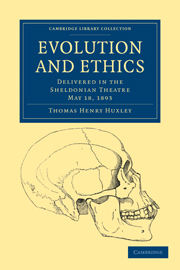Book contents
EVOLUTION AND ETHICS
Published online by Cambridge University Press: 29 August 2010
Summary
Soleo enim et in aliena castra transire, non tanquam transfuga, sed tanquam explorator.
(L. Annæi Senecæ Epist. II. 4.)There is a delightful child's story, known by the title of “ Jack and the Bean-stalk,” with which my contemporaries who are present will be familiar. But so many of our grave and reverend juniors have been brought up on severer intellectual diet and, perhaps, have become acquainted with fairyland only through primers of comparative mythology, that it may be needful to give an outline of the tale. It is a legend of a bean-plant, which grows and grows until it reaches the high heavens and there spreads out into a vast canopy of foliage. The hero, being moved to climb the stalk, discovers that the leafy expanse supports a world, composed of the same elements as that below, but yet strangely new; and his adventures there, on which I may not dwell, must have completely changed his views of the nature of things; though the story, not having been composed by, or for, philosophers, has nothing to say about views.
My present enterprise has a certain analogy to that of the daring adventurer. I beg you to accompany me in an attempt to reach a world which, to many, is probably strange, by the help of a bean. It is, as you know, a simple, inert-looking thing. Yet, if planted under proper conditions, of which sufficient warmth is one of the most important, it manifests active powers of a very remarkable kind.
- Type
- Chapter
- Information
- Evolution and EthicsDelivered in the Sheldonian Theatre, May 18, 1893, pp. 1 - 37Publisher: Cambridge University PressPrint publication year: 2009First published in: 1893



